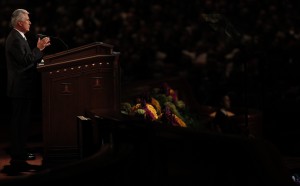
President Dieter F. Uchtdorf
President Dieter F. Uchtdorf, second counselor in the First Presidency, began the Sunday morning session by illustrating a metaphor off of the piece “Entrance to Enlightenment“ hanging in his office.
“It is part of our condition as mortal beings to sometimes feel as though we are surrounded by darkness … but even though we may feel lost in the midst of our current circumstances, God promises the hope of His light,” President Uchtdorf said.
President Uchtdorf continued with a story about a girl he called Jane, who was repeatedly beaten and abused since she was three. Jane stopped feeling in order to protect herself. She had no refuge and had lost all hope. She was surrounded by darkness and could see no light in her world.
At age 18, Jane found the Church. The hope the gospel brought her allowed her to be baptized. For the first time, light filled her life. She left the darkness behind and fully accepted the light.
Years later, however, Jane’s abuser passed, leaving her troubled again by the horrific events of her youth. She came to realize although darkness exists, she could not dwell there. She became a school teacher and “has become a tireless defender of the weak, the victimized and the discouraged.”
President Uchtdorf went on to address those who feel darkness surrounding them. He bore his testimony of God’s light and its reality. He taught that “spiritual light rarely comes to those who merely sit in darkness waiting for someone to flip a switch. It takes an act of faith to open our eyes to the Light of Christ.”
He went on to say how others can open their eyes to God’s light.
He counseled that the best place to start is where one is currently. No matter how unqualified one feels, the moment Heavenly Father is sought out, His light start to fill his or her life.
The second way to be open to the hope of God’s light is to turn to the Lord by lifting up souls in prayer. President Uchtdorf urged the congregation to pour their souls out to their Father in Heaven, to plead for His strength, to tell Him about struggles and to express gratitude.
The third way to see Christ’s light is by walking in the light. Heavenly Father knows that His children are not perfect. He knows they will stumble and make mistakes. Despite this, He desires that they rise up and reach the potential He designed for them.
God sends His Son to “illuminate the way and show us how to safely cross the stumbling blocks placed in our path.”
President Uchtdorf invites all who feel they walk in darkness to rely on this promise given by the Savior, “I am the light of the world: he that followeth me shalt not walk in darkness, but shall have the light of life.”
President Uchtdorf bore witness that the world’s living hope is in Christ Jesus. He testified that with Christ, darkness cannot succeed, and that darkness cannot stand before the brilliant light of the Son of the Living God.
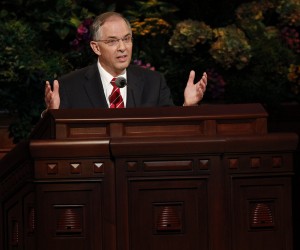
Elder Neil L. Andersen
Elder Neil L. Andersen of the Quorum of the Twelve discussed how the mortal life of Jesus Christ was filled with miracles, including the greatest miracle of all, His glorious resurrection.
Elder Andersen described the scene of the eleven apostles when the risen Lord told them to “Go ye therefore, and teach all nations, baptizing them in the name of the Father, and of the Son, and of the Holy Ghost. Go ye into all the world, and preach the gospel to every creature.”
The Church was restored to the earth 183 years ago, and the Lord still commands that, “the sound must go forth … into all the world, and unto the uttermost parts of the earth.”
The Savior, as He did with the eleven apostles, assures His latter-day saints that these miracles can and will accompany them in spreading His gospel.
When Elder Andersen and Elder David A. Bednar were missionaries, there were 16,000 missionaries. Now, there are 65,000 missionaries, which is more than ever before.
“This is a remarkable time of miracles,” Elder Andersen said. “We are witnessing the miracles of the Lord as His gospel is spreading across the world.”
Elder Andersen stated that as the Lord has inspired more missionaries to serve, He is also “awakening the minds and opening the hearts of more good and honest people to receive His missionaries.”
He stated that even those not serving missions are an important part of this unfolding miracle. They must paint a missionary badge on their hearts, not with ink, but with the Spirit for the living God. Everyone has a contribution to make to this miracle.
Elder Andersen instructed the congregation to pray for their own opportunities to share the gospel. He promised that as they prayed to know whom they should share the gospel message with, names and faces would come into their minds. He promised that faith will overcome doubt, and the Lord will bless them with their very own miracles.
He invited those using the Internet and mobile phones to invite others to “come and see” by sharing their faith online, as part of their daily lives. Social media helps the youth have greater faith about sharing the gospel in person. A youth in Boston said, “This isn’t missionary work. This is missionary fun.”
He urged listeners to keep full-time missionaries in their thoughts and prayers. “The Lord trusts them and has called them to teach and bless those who seek Him,” he said.
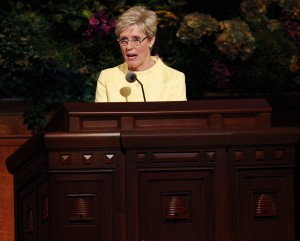
Sister Rosemary M. Wixom
Sister Rosemary M. Wixom, the Primary General President, talked about the great influence a person can have on this world by influencing a child.
Sister Wixom talked about a child’s beliefs and self-worth, and how it is shaped early in their lives. Everyone has the ability to increase a child’s confidence in his or herself and to increase a child’s faith in Jesus Christ by the words they speak.
“How we speak to our children and the words we use can encourage and uplift them and strengthen their faith to stay on the path back to Heavenly Father. They come to this earth ready to listen,” she said.
Sister Wixom gave three ways people can better influence children.
The first is to pray to know a child’s needs. “To speak to a child’s heart, we must know a child’s needs,” she said. When they do this, their words will have a stronger power to reach the children’s hearts. Their efforts will be magnified when they seek the direction of the Holy Ghost.
Second, they must disconnect and listen with love. “Unfortunately, the distractions of this world prevent many children from hearing encouraging words that could shape their view of themselves,” she said.
Sister Wixom asks listeners to choose a time each day to disconnect from technology and reconnect with each other. “Precious moments of opportunity to interact and converse with our children dissolve when we are occupied with distractions,” she said. She said that when parents give full attention to their children, a conversation will begin and they can enjoy listening to each other.
Third, parents can influence their children through words they write to them. She urged them to speak and write words to their children which will reflect the love their Heavenly Father has for them.
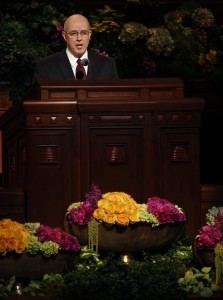
Elder L. Whitney Clayton
Elder L. Whitney Clayton of the Presidency of the Seventy started with a story about his four-year-old granddaughter who told him to “watch and learn”.
Elder Clayton talked about how much can be learned by watching and then considering what was seen and felt. He has observed wonderful, faithful marriages produced principles which build strong, satisfying marriages.
First, he observed that in the happiest of marriages, husband and wife consider their relationship to be a pearl beyond price. They know other relationships of any kind can bring as much joy as their marriage. “Watch and learn: the best marriage partners regard their marriages as priceless,” he said.
Second, he stated that successful marriages are built on the foundation of faith in the Lord. Couples who have a mutual quest to be obedient and good practice patterns of faith. “Faith is the foundation of every virtue that strengthens marriage,” he said. “Watch and learn: faith in the Lord Jesus Christ is the foundation of happy eternal marriages.”
Third, happy marriages rely on the gift of repentance. He stated that repentance is an essential element in every good marriage. Repentance helps restore and maintain harmony and peace. He talked about the qualities of humility, and how humility recognizes that no one can change someone else, but with “faith, effort and the help of God, we can undergo our own mighty change of heart.”
“Watch and learn: repentance and humility build happy marriages,” he said.
Fourth, in wonderful, happy marriages, husbands and wives treat each other as equal partners with respect. The divine law says that husband and wife are equal, and that no husband or wife have dominance over the other.
In great marriages, decisions are made unanimously with each acting as a fully participant and the ability to voice and vote. Husbands and wives work side by side in doing the most important work there is — the work done in homes.
He stated that where there is respect, there is also transparency, which is a key element in happy marriages. Having a mutual respect of no secrets brings husbands and wives together giving them both access to all information. Prophets teach couples to be “fiercely loyal” to one another. Loyalty brings respect. “Watch and learn: terrific marriages are completely respectful, transparent and loyal,” he said.
Fifth, the happiest marriages radiate obedience to one of the happiest commandments — that couples “live together in love.” The Lord commands us that couples must cleave to one another. Elder Clayton taught that the word cleave means to be “completely devoted and faithful to someone.”
Couples must cleave to God and to each other by serving and loving one another, and by completely keeping the commandments. They must both make each other their greatest priority. “Watch and learn: successful couples love each other with complete devotion.”
He counseled those who are divorced or single parents that their struggles need not last forever and to persevere.
“The promises of the Lord are extended to all those who follow the pattern of life that builds happy, holy marriage relationships,” he said.
He testified that marriage is a gift from God to us and the opportunity to have eternal marriage is of God.
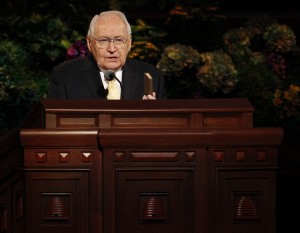
Elder L. Tom Perry
Elder L. Tom Perry of the Quorum of the Twelve talked about the war faced in these latter-days. He stated this war is with thought, words and deeds. It is a war with sin. Many institutions are in direct conflict with those that were instituted by the Lord Himself, he said.
He emphasized the statement “obedience to law is liberty.” He talked about the knowledge of pre-mortal history. Members of the Church recognize that God presented His plan to His children there and that the Savior would redeem all mankind. Satan wanted to destroy man’s agency. Elder Perry quoted President Harold B. Lee by saying, “Next to life itself, free agency is God’s greatest gift to mankind.”
Agency became the biggest issue over which the war in heaven was fought. Satan’s backup plan is to tempt God’s children and to make them miserable even as he is. “None of us should never underestimate how driven Satan is to succeed,” Elder Perry said.
Every choice made during this life is a test of agency. Choices to obey or disobey are actually choices between liberty and eternal life, captivity and death.
Elder Perry outlined the ten commandments and the four he believes the world takes seriously: murder, stealing, lying and the responsibility of children to their parents.
The other six, he said are dismissed: Today’s world has other Gods, worships false idols, uses the name of God in vain, does not keep the Sabbath day holy, treats sexual relations outside of marriage as recreation and covets as a common way of life.
“For man to substitute his own rules for the laws of God on either end of life is the height of presumption and the depth of sin,” he said.
There are depreciating attitudes about the sanctity of marriage and the consequences are shown in the deteriorating strength of the family, which is causing widespread damage to society.
He encouraged the congregation to look at commandments as loving counsel from a wise, all-knowing Heavenly Father. His goal for His children is eternal happiness. He provides commandments as direction to return to Him. This is the only way anyone will be eternally happy.
Elder Perry powerfully stated, “Sin will always be sin. Disobedience to the Lord’s commandments will always deprive us of His blessings.”
While the world is constantly and drastically changing, God and His commandments remain constant. “Men and women receive their agency as a gift from God, but their liberty, and, in turn, their eternal happiness comes from obedience to His laws,” he said.
He stated that there are moral absolutes. Members of the Church must stand morally firm in times of war. He stated that the gospel of Christ never wavers, and neither should the Church’s families or wards.
“We must not pick and choose which commandments we think are important to keep but acknowledge all of God’s commandments,” he said. He encouraged listeners to stand firm and steadfast, having faith in the Lord’s consistency.
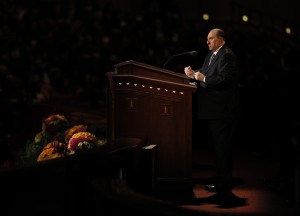
President Thomas S. Monson
President Thomas S. Monson was the concluding speaker of the Sunday morning session. He began with a discussion about the age-old search of knowledge and understanding concerning this mortal existence and our place and purpose among all of it.
The spirit of truth is of God, and no man receives the fullness of truth unless he keeps the commandments. He told how a loving Heavenly Father has already plotted a course for His children, and there is no need for them to travel an unmarked path in search of truth.
President Monson taught about learning obedience from experiences.
He shared an experience he had with his friend Danny in Provo Canyon. The young boys wanted to have a campfire in an area with tall grass and weeds. Finally, President Monson decided they should simply set the weeds on fire. He thought they could burn a circle in the weeds. Danny agreed, and President Monson went to the cabin to get matches.
President Monson struck a match and happily watched as the weeds disappeared, but soon they realized the fire wasn’t going to magically extinguish itself. The flames started burning up the mountainside, and the boys panicked.
They ran for help as they realized it was their only option. After several hours, the remaining embers were smothered by every available man and woman at Vivian Park. That day they learned the importance of obedience.
“The Lord has provided guidelines and commandments to help ensure our spiritual safety so that we might successfully navigate this often treacherous mortal existence and return eventually to our Heavenly Father,” he said.
He taught that all prophets, whether ancient or modern, know obedience is essential to salvation. He told the story of Abraham and Isaac, and Abraham’s steadfast obedience to the Lord to offer his son as a sacrifice. His children of today are not asked to prove our obedience in such a dramatic way, but obedience is still required of them.
“It is essential for us to realize that we … are entitled to … strength and knowledge. It is readily available to each of us today as we obey God’s commandments,” he said.
“The great test of this life is obedience,” President Monson said. He gave the Savior as the greatest example of obedience. Christ demonstrated the love of God by living a perfect life. He was always obedient. Even when He was tempted by the devil, he remained obedient and a divine example to the world.
The inquiry about humanity’s purpose and place in this mortal life, and the answers they wish to receive about their existence, can be theirs when they willingly obey the Lord’s commandments.
Watch the Sunday morning session of the 183 Annual General Conference session here.




